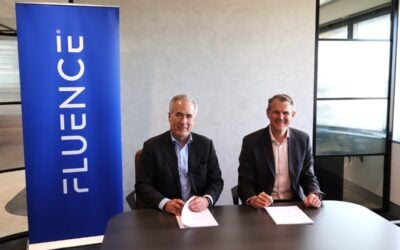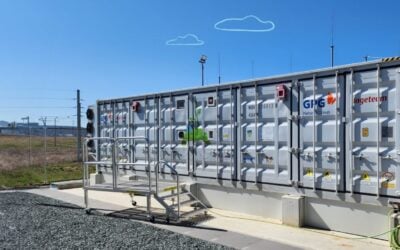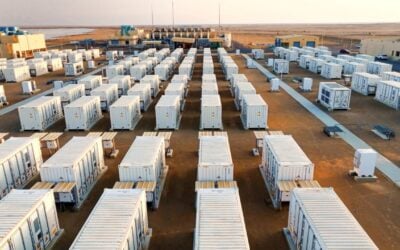AES and Jordan’s NEPCO sign the MoU, 25 October 2015. Image: AES Corporation.
Jordan’s state power company, NEPCO (National Electric Company), looks likely to deploy 20MW of battery-based energy storage, which according to storage provider AES Corporation will be aimed at easing the integration of wind and solar into the country’s energy networks.
AES and NEPCO signed a Memorandum of Understanding (MoU) yesterday for the project, which would make the Kingdom something of an early leader in energy storage in the wider region. The system, which will be built on AES’ Advancion platform, will be able to draw power from the grid as well as push it out, meaning the batteries will serve as an effective 40MW of flexibility resources.
Enjoy 12 months of exclusive analysis
- Regular insight and analysis of the industry’s biggest developments
- In-depth interviews with the industry’s leading figures
- Annual digital subscription to the PV Tech Power journal
- Discounts on Solar Media’s portfolio of events, in-person and virtual
A signing ceremony for the latest MoU was attended by two AES executives and Abdul Fattah Al Dardadkah, the CEO of NEPCO, with Jordan’s energy minister, Dr Ibrahim Saif and US ambassador Alice Wells, also present.
The project still requires final approval. As has sometimes been the case in solar and in other industries, the signing of MoUs do not always bear fruit, with some PV markets seen to be suffering from “false starts” despite signing high profile MoU agreements for big projects. Nonetheless, once approval has been gained, AES said the storage facility would take a year to construct and then begin operations. AES Corporation has been active in Jordan since 2009, when it constructed a combined cycle gas plant, Amman East Power Plant in Al Manakher, near to the site of the new storage facility.
The Jordan project follows two other recently announced large-scale storage orders for AES in new markets. The company is currently executing multi-megawatt installations of Advancion systems in Northern Ireland and in the Netherlands. In each case the systems will respond to signals to balance power supply and demand on the local grid and allowing for the greater integration of variable renewable energy.
Both are scheduled to be completed and online by the end of this year and will add to deployments by the company, which to date have totalled 86MW of battery-based systems already in commercial operation in the US and Chile, as well as four new projects in the US, Dominican Republic and the UK in the “late stages of development”, which add up to 298MW of storage.
Energy “have-nots”
In a feature report on solar deployment in the Middle East for PV Tech Storage’s sister publication, the downstream solar industry journal PV Tech Power, Jordan was described as one of the energy “have-nots” of the region.
In other words, unlike many of its near-neighbours, the country lacks its own oil resources, with the PV Tech Power piece, published in February, saying that energy prices are high, while supply remains “not entirely steady”.
The Kingdom is hoping the flexibility added to the network by the storage system will help to bring down the cost of renewable energy deployment there, after a 2014 round of tenders for solar PV had to be postponed until this year following concerns being raised over available grid connection. Despite these challenges, research firm IHS has earmarked Jordan’s solar sector for “rapid growth” this year, while in May the Middle East Solar Energy Association’s then-president Vahid Fotuhi said in response to tariffs set in the tender process that utility-scale solar in the Middle East could be “cheaper than natural gas for power generation”.






